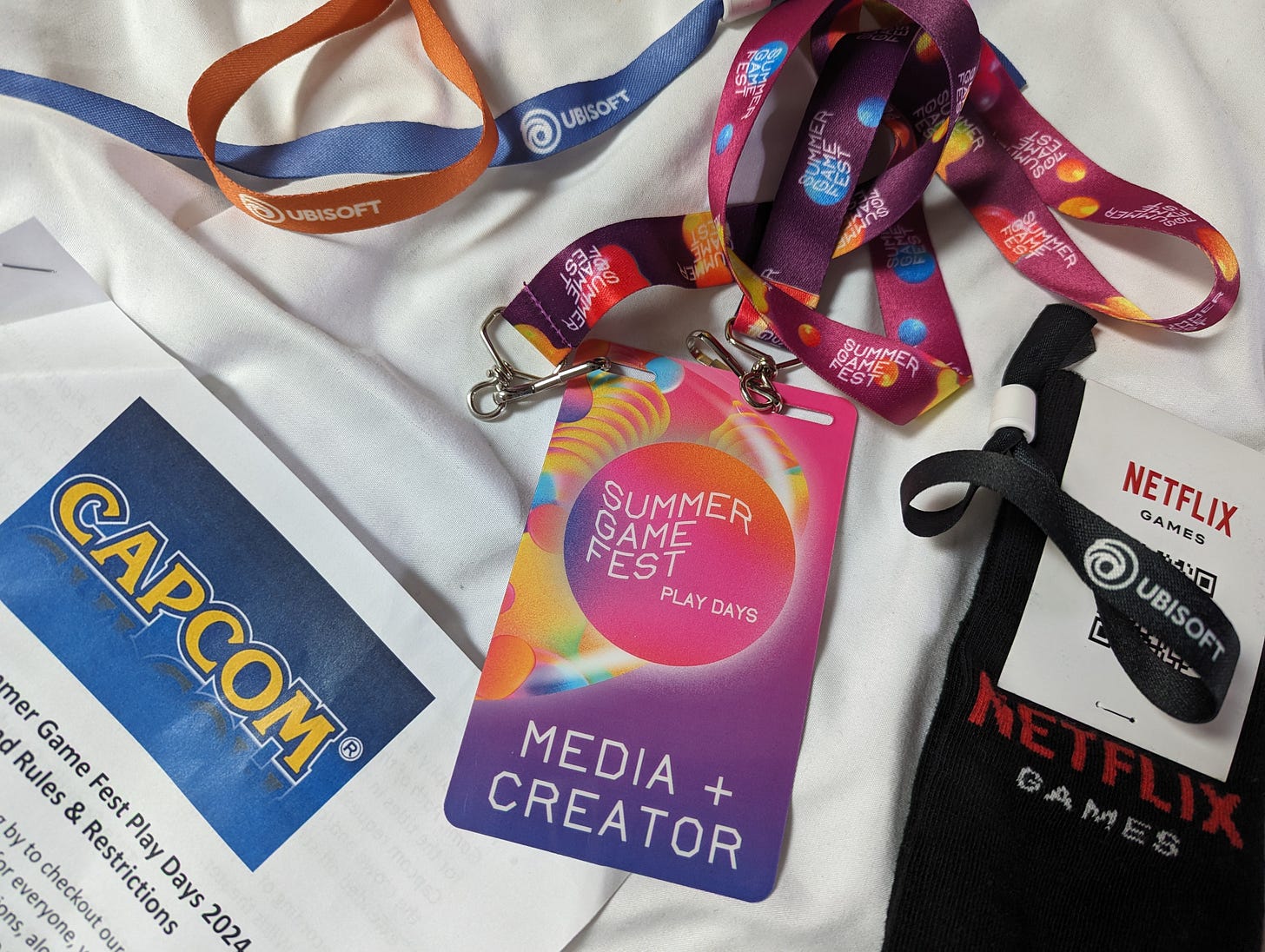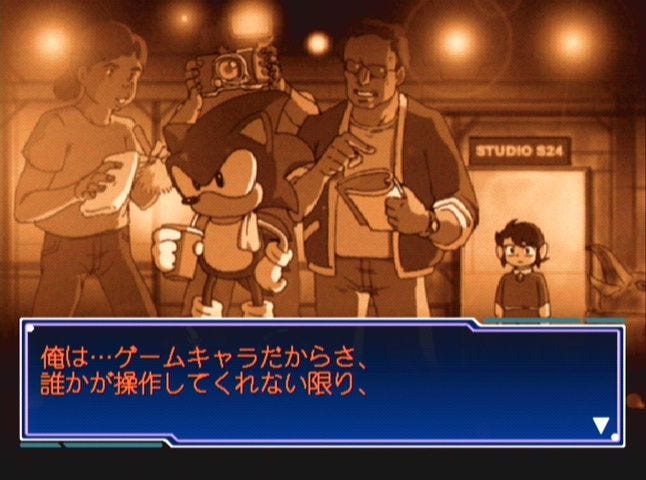Our Summer Game Fest highlights
Plus Sega's year 2000 and the beauty and pain of auctions in board games
Hello there! I hope everyone’s recovered from a week of “summer” game reveals. I didn’t make it to LA but below you’ll find thoughts from someone who did, as well as my own musings as a person who’s been glued to YouTube. We’re also covering all the games hitting the subs, extolling the virtues of auctions in board games, and continuing our look at the Sega games of the early 2000s.
Alice is currently off for a few weeks on parental leave, so I’m wishing her all the best and throwing a big thanks to our wonderful guest writers Jam Walker and Anthony Read who are helping fill the void. Let’s get to it!
The value of Geoff Fest
By Jam
I've been lucky enough to be in Los Angeles for Summer Game Fest over the past few days. As widely mocked as Geoff Keighley’s annual event is, I actually do see the value in it on several fronts.
As a media-only event with no public access it allows reporters and critics from across the globe to network and socialise in a relaxed environment. Given how ever-dwindling the traditional games media landscape is these days, (and how much of a remote bubble Australia’s is), it presents an invaluable opportunity to forge professional connections, as well as a chance to just collectively commiserate about the Hellscape that is, uh… the whole games industry right now.
What was really driven home to me during so many of my preview appointments though was how valuable it is for developers too.
In many instances, SGF is the first time that these games have been played by anyone completely outside of the studio or publisher. While many of the preview sessions are operated by PR representatives, many more, even for AAA games, are hosted personally by the game's development leads. Regardless of whether their game is the work of a team of 200 people or two, they genuinely value feedback, frequently take notes, and will oftentimes ask questions of us just as much as we ask questions of them.
There's many valid criticisms to be had of SGF, just as there was for E3 that preceded it. Geoff's events really aren't the more cost-effective for publishers alternative that they're widely perceived as being, and Los Angeles in early June isn't awesome. I'd hate to see it vanish as an in-person event though as I still do believe that the juice is worth the squeeze.
Plus I actually met Geoff this year and he was extremely nice.
What to play
On PlayStation Plus, members paying for the Extra tier can play the recent remaster of Grand Theft Auto: San Andreas. Those paying more for the classics catalogue also have access to three PS2 games, which are running on a new emulator allowing for quick saves and rewind. There’s Tomb Raider Legend, Star Wars Clone Wars and the first Sly Cooper. Those first two are already playable on current Xbox consoles (and Tomb Raider is the superior 360 version), while Sly was remastered for PS3 in a version there’s now no way to play, so overall three good games but slightly weird choices to mark PS2’s arrival on PS5.
For Game Pass, there’s a rare PC-only addition in new tabletop-style Cthulu-themed RPG Depersonalization. A little later this week you’ll be able to grab middling but enjoyable space prison horror shooter The Callisto Protocol as well as WWI FPS Isonzo.
Over at Epic Games the incredible Marvel’s Midnight Suns is free for the next two days, and you should absolutely go and grab it if you don’t have it already. It combines X-COM-like tactics with some light TCG mechanics and a smattering of (strangely platonic) dating sim elements. It’s really good.
Indies and originals win out
By Tim
Gooped though I was to see the likes of Astro Bot, Perfect Dark and Gears of War at the big showcases this year, it feels more than ever like these events are best at shining a light on interesting ideas and incredible art that would otherwise be hard to surface in the din of the thousands of releases a year. And in that context, here are my picks for 12 excellent showings at the recent events. I’m including anything that gave a look at gameplay, or at least the idea of gameplay.
Arranger: What if a plastic sliding tile puzzle was an entire world, and you had an RPG in it?
Battle Vision Network: A PvP blend of Might & Magic and Grindstone, but a space TV show.
Clair Obscur: Expedition 33: Evocative French turn-based RPG with one of the raddest Thanos-esque narrative setups I’ve ever heard.
Dungeons of Hinterberg: This cozy alpine Zelda-like sounds like everything I want tbh.
Fear the Spotlight: This faux-PS1 era horror stealth game released last year but is getting a revamp.
Kulebra and the Souls of Limbo: A Latin American take on the afterlife where you’re resolving cute souls’ time loops.
Mixtape: A Melbourne-made magical coming of age story set to a huge licensed 90s pop soundtrack.
Neva: A gorgeous platformer with a sword, a good wolf and beautifully inky art.
Petal Runner: A Game Boy Color RPG that appears to be aiming for Pokemon nostalgia but which I suspect has something more to say.
Screenbound: Platform in 2D and 3D simultaneously via a Game Boy that’s always in your face. Is it too brain-breaking to work? We’ll see. But it rules.
South of Midnight (pictured): Once the score dynamically became a song about Two-Toed Tom the giant alligator boss, this magical realism American folktale jumped pretty high on my list.
UFO50: A collection of 50 games from an imaginary 80s game company that was ahead of its time. This thing is very specifically my jam.
Going Once
by Anthony
“So, who wants Mayfair?”
In the world of hobbyist board gaming, one word strikes more fear into the hearts of true gamers than any scuffed card or lost meeple: Monopoly. The granddaddy of being mean to your friends on the table has as many detractors as aficionados, and it is also the starting point for one of my most loved tropes in gaming.
Auctions.
If you have been to a real estate street auction, stared at the hands rising and falling, the tension and the hubris, you know how deadly powerful the draw of the bid can be. As such, you can get a smaller dose of this power on the tabletop in some of the finest games ever designed.
Take the Good Doctor of board gaming for example. Dr. Reiner Knizia, a German mathematician and the designer of some of the most beloved games ever (Tigris & Euphrates was on Board Game Geeks’ top 100 for 21 years), has often made the humble auction the centre of his designs. Modern Art pits rival galleries against one another, bidding for artworks from real-life designers, with only the most popular artists gaining money back for their buyers. High Society sees you as a French socialite, buying signifiers of your wealth and taste, with the person spending the most automatically losing at the end of the game; because spending too much is just so gauche, right?
The trope is also present in more popular games than you might realise. Ticket to Ride, for example, asks you to effectively ‘bid’ on a line that you think you can complete. And, heaven forbid someone figures that out, they can cut you out of that route in a sweep of VPs and catharsis.
So, if you are interested in making poor decisions and laughing while your friends see their cash float away in a miasma of tears, jump onto BGG and look up auction games. You won’t be disappointed.
And, if you must play Monopoly, always use the auction rule. No exceptions.
Retro Esoterica
by Tim
Sega’s early 2000s - part 2
2000 With the Dreamcast now out worldwide the stage is set for an avalanche of cutting edge games to overshadow the imminent launch of the PlayStation 2. Of course we know that didn’t happen, and Sega’s console was immediately buried. But the company did still publish some excellent games this year.
We saw an arcade port of Crazy Taxi (ya ya ya ya!), as well as a trifecta of weird peripheral ports in Samba de Amigo, Sega Marine Fishing and Typing of the Dead. In retrospect, asking people to buy a typing controller for a weird Mavis Beacon / zombie shooter hybrid might have been a little too weird, but I love that it exists.
The company also tried to play to its base with sim and arcade racers Sega GT and Daytona USA 2001, while pushing things forward with all-time-great skate adventure Jet Set Radio. Finally, it made use of that built-in modem (at least in regions where the telcos co-operated, I’m looking at you Telstra) with cutting edge MMO Phantasy Star Online.
2001 This is the year Sega discontinued the Dreamcast and announced it would develop games for Sony, Nintendo and Microsoft’s platforms. But again, we’re focusing on the games it published here, not its continued financial losses and turmoil with its workers and studios heads!
The Dreamcast saw some its finest first party games as it bowed out here, including Crazy Taxi 2, Shenmue 2, the incredible musical shooter Rez and the introduction of everyone’s favourite anti-hero Shadow in Sonic Adventure 2. But the console’s true swansong is aruably the Japan-only Segagaga (pictured), a bizarre mash-up RPG filled with Sega references, in which you’re tasked with saving the company from itself as it competes with obvious Sony parody Dogma.
Meanwhile we also saw the beginnings of Sega activity on other consoles. In some cases outside publishers (notably Acclaim) adapted Dreamcast games , but Sega itself got in on the action too. Arcade port Super Monkey Ball went straight to Gamecube, while versions of ChuChu Rocket! and Columns came to the Game Boy Advance. And in the ultimate surreal moment for Sega fans, Sonic arrived on Nintendo systems with Sonic Advance and a Gamecube port of the brand new Sonic Adventure 2! The Dreamcast was truly gone.
Next time: Full third party












